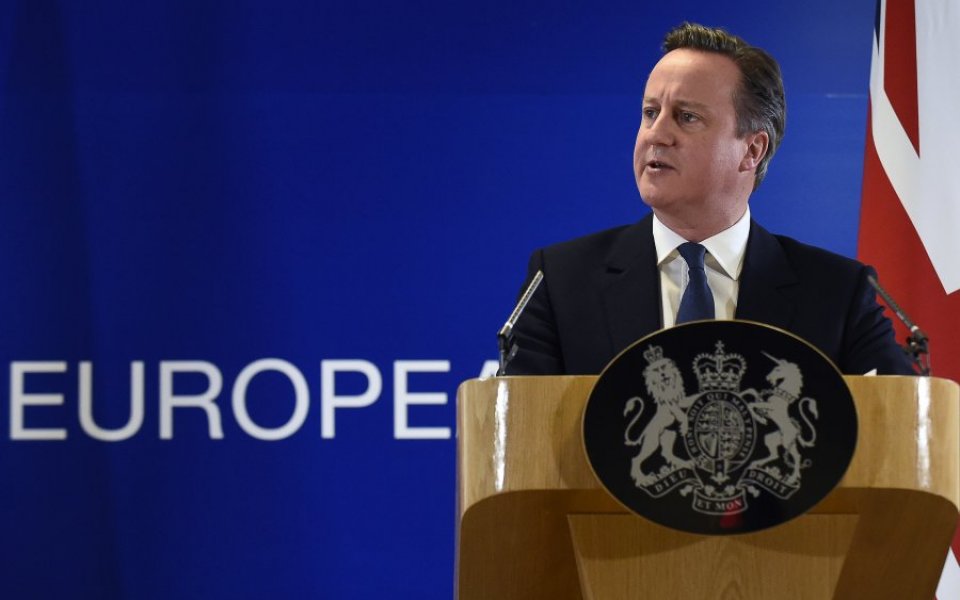EU referendum: European Commission president Donald Tusk says there is “unanimous support” for a settlement over the UK’s position in the EU as David Cameron recommends deal

The City of London will be safeguarded under a new deal agreed between European leaders, after European Commission president Donald Tusk said there is "unanimous support" for a new settlement over the UK's position in the EU.
Deal. Unanimous support for new settlement for #UKinEU
— Charles Michel (@eucopresident) February 19, 2016
David Cameron said the deal will give "special status" to the UK in the European Union, adding he will recommend the deal to his cabinet today.
The BBC reported the deal includes a seven-year "brake" on welfare payments to EU nationals, as well as safeguards to protect the City.
It also includes curbs on child benefit, which will apply to new applicants as soon as the law is passed, and from 2020 for existing claimants.
PM: I have negotiated a deal to give UK special status in the EU. I will be recommending it to Cabinet tomorrow. Press conference shortly.
— UK Prime Minister (@10DowningStreet) February 19, 2016
At a press conference, Cameron said the deal was a "milestone – not the end point".
"I'm not claiming I have solved all of Europe's problems. I'm not claiming I have solved all of Britain's problems," he said.
Once ministers have been briefed by Cameron, at 10 o'clock tomorrow morning, they will be able to begin campaigning for either side of the vote.
Matthew Elliott, chief executive of the Vote Leave campaign, immediately hit out at the deal.
"David Cameron always wanted to campaign to stay in the EU so he only ever asked for very minor changes.
"He will now declare victory but it is an entirely hollow one: the EU courts are still in control of our borders and our laws, we still send £350m a week to the EU instead of spending it here on our priorities and we have not taken back any control."
This evening's statement came after hours of delays, as David Cameron attempted to hammer out a deal with his counterparts in the European Union.
Officials had hoped to come to an agreement over an "English breakfast" this morning, but after multiple delays, Tusk's spokesman, Preben Aamann, tweeted that negotiations with all 28 member states would begin over dinner.
Now "English dinner" with time tbc. Bilateral consultations continue. #EUCO #UKinEU
— Preben Aamann (@PrebenEUspox) February 19, 2016
Among the key obstacles to securing a deal was reportedly Greek Prime Minister Alexis Tsipras's demand that EU leaders commit to open borders until at least March in exchange for his support of Prime Minister David Cameron's reform agenda.
Cameron also met one-on-one twice today with Polish Prime Minister Beata Szydlo, who raised concerns over Cameron's plans to limit welfare benefits for EU migrants, including child benefit for migrants in the UK whose children live abroad.
https://twitter.com/PLPermRepEU/status/700691707264946176
The meetings were just two of many so-called bilateral negotiations for Cameron, who also sat down with Tusk this morning, just hours after wrapping up more overnight talks with French President Francois Hollande and others.
Cameron also sat down with German Chancellor Angela Merkel today.
https://twitter.com/RegSprecher/status/700681491135660032
Cameron told reporters on his way into today's meetings that he will "only do a deal if we get what Britain needs".
"I’m going to get back in there, we’re going to do some more work, and I’ll do everything I can," Cameron added.
Cameron held talks until 5:30am local time with Tusk and European Commission President Jean-Claude Juncker last night, as well as Hollande, who told reporters this morning that he remains opposed to any deal that gives non-Eurozone states more powers to stall financial regulation.
Read more: Hollande says EU proposals have been changed overnight
The Belgian and Czech premiers also met with Tusk and Juncker in the wee hours of the morning to raise concerns about certain aspects of Cameron's proposed reform deal, including an exemption for Britain from the EU's "ever closer union" commitment, as well as the UK government's plans to limit benefits for EU migrants.
"For now, we have made some progress but a lot still remains to be done," Tusk told reporters after last night's meetings.
Cameron had hoped to hammer out a final agreement today, paving the way for an in/out vote on Britain’s EU membership as soon as 23 June. Yet last night’s gridlock raised questions about whether a deal – and a referendum – are likely to happen anytime soon.
Read more: Down to the wire – Cameron battles to secure EU deal
Cameron has promised to hold the referendum by the end of 2017.
Energy secretary Amber Rudd said this morning that the UK is "not going to be rushed" into a deal, telling BBC's Radio 4: "There are various elements moving around, we will have to wait and see to find out where they finally land."
Rudd warned that any deal is "out of reach at the moment", saying, "I don’t think we can underestimate how difficult it is to get 27 member states to agree."